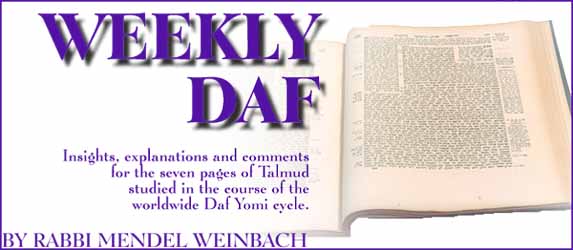Weekly Daf #119
Menachos 16-22 -- Issue #119
2-8 Sivan 5756 / 20-26 May 1996
The Doubter and the Ignoramus
Any kohen who does not believe in the divine origin of the service in the sanctuary (but that Moshe himself thought it up - Rashi) is not entitled to any share of the sacrificial flesh or meal offerings along with the other kohanim.This ruling which Rabbi Shimon bases on a passage in the Torah suggests that the only criterion is faith and that there is a need to disqualify a kohen who is a faithless scholar. But in Mesechta Chullin (130a) Rabbi Yonasan seems to communicate the opposite when he rules that one should not give his tithes to a kohen who is an ignoramus in Torah. He bases this ruling on a passage in Divrei Hayamim II (31:4) which records the exhortation of King Chizkiyahu to the residents of Jerusalem to give their tithes to the kohanim and levites so that "they might adhere firmly to the Torah of Hashem." This limits such gifts to those who adhere firmly to the Torah and eliminate those who are ignorant of its contents. He does not even bother to mention the need to avoid giving tithes to a faithless kohen, indicating that this is so obvious that it requires no passage to communicate it.
Tosefos resolves this problem by pointing out that tithes are given by individuals to the kohen of their choice and it is therefore obvious that if we are to refrain from giving to an unlearned kohen then we are certainly expected to do so in regard to a faithless one. But when it comes to sharing in the sacrificial portions the Torah states that all kohanim who are on duty should share equally. This would seem to indicate that every kohen is entitled to a share, even if he is a doubter. A Torah passage is therefore required to disqualify him.
How Great the Love of Torah
This was the tribute paid by Rabbi Elazar ben Shamoa to the extraordinary love of Torah demonstrated by his disciple, the Sage Yosef Habavli.
The latter had asked Rabbi Elazar what the rule was when someone slaughtered a sacrificial animal with the intention of leaving some of its blood unattended till the next day - does this disqualify the sacrifice in the same manner as it is disqualified according to Rabbi Yehuda if the slaughterer intended that all of the blood be left till tomorrow?
When the question was first raised at night Rabbi Elazar responded that the sacrifice was kosher. When the question was repeated in the morning and again at noon the reply was the same. Finally, in the later afternoon the same question elicited a qualified response: "Kosher - but Rabbi Eliezer disqualifies it."
At that moment the face of Yosef Habavli lit up in joy. Rabbi Elazar interpreted this as a sign that his previous responses were not acceptable to his disciple. "Your responses were correct," the disciple reassured him, "But I recalled once learning that there was a dissenting opinion of Rabbi Yehuda and when I unsuccessfully checked with all of his disciples for corroboration I began to have misgivings that perhaps my memory had failed me. When you now mentioned a dissenting opinion I was overjoyed at recovering an item of Torah which I feared I had lost."
When Rabbi Elazar heard this explanation tears came to his eyes and he exclaimed:
"How fortunate are you, Torah scholars, that the words of Torah are so precious to you."
It was then that he drew the parallel between his beloved disciple and King David, the author of Tehillim.
General Editor: Rabbi Moshe Newman
Production Design: Lev Seltzer
HTML Design: Michael Treblow
© 1995 Ohr Somayach International - All rights reserved. This publication may be distributed to another person intact without prior permission. We also encourage you to include this material in other publications, such as synagogue newsletters. However, we ask that you contact us beforehand for permission, and then send us a sample issue.
This publication is available via E-Mail
Ohr Somayach Institutions is an international network of Yeshivot and outreach centers, with branches in North America, Europe, South Africa and South America. The Central Campus in Jerusalem provides a full range of educational services for over 685 full-time students.
The Jewish Learning Exchange (JLE) of Ohr Somayach offers summer and winter programs in Israel that attract hundreds of university students from around the world for 3 to 8 weeks of study and touring.
Ohr Somayach's Web site is hosted by TeamGenesis
 Copyright © 1995 Ohr Somayach International. Send us feedback.
Copyright © 1995 Ohr Somayach International. Send us feedback.Dedication opportunities are available for Weekly Daf. Please contact us for details.







